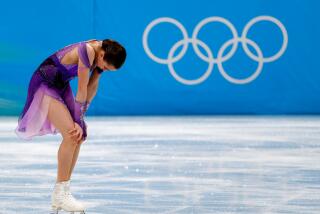Athlete Skates on Thin Ice : Young Awaits Ruling on Positive Drug Test
- Share via
CARY, N.C. — Like many of the 79 ice hockey players at the U.S. Olympic Festival, Scott Young does not know what his chances are to make the team for the 1988 Winter Olympics in Calgary.
That is not to say Young has doubts about his ability. But, unlike the other players, his immediate future will be determined by forces other than how well he performs this week. He must wait for an October vote by the 11-member council of the International Ice Hockey Federation (IIHF).
Young, a Boston University sophomore from Clinton, Mass., was suspended by the IIHF for 18 months last April after testing positive for the stimulant ephedrine at the World Championships in Vienna.
Young said the ephedrine came from six Sine-Aid tablets he took for relief from a cold the day before he was randomly selected for the test. He had passed a drug test the day before he took the Sine-Aid, a non-prescription, over-the-counter decongestant.
This is the latest in a number of cases involving athletes who tested positive for ephedrine after taking cold medication. The best known occurred at the Munich Summer Olympics in 1972, when U.S. swimmer Rick DeMont was forced to return his gold medal after a drug test.
Admitting that the punishment is too severe for the crime, the International Olympic Committee’s medical commission recommended at a meeting last May in Istanbul, Turkey, that athletes serve only three months’ suspension if it is determined they took ephedrine by accident. But if adopted by the entire IOC membership, that would apply only to athletes who test positive for the drug in the Olympics.
Each of the international federations governing individual sports sets its own rules for other competitions.
In appealing Young’s case to the IIHF, the Amateur Hockey Assn. of the United States (AHAUS) will recommend that, instead of an 18-month suspension for testing positive for ephedrine, the rule should read “up to 18 months.”
Walter Bush, AHAUS president and the U.S. representative on the IIHF council, said he will request that Young’s suspension be limited to five months, starting last May, which would enable him to play internationally in October. He would miss the St. Andrews Gold Cup at Scotland in September but would be eligible for the rest of the U.S. team’s 66-game schedule leading to the Winter Olympics, Feb. 13-28.
Bush said he is optimistic, noting that there have been two other ice escapades involving ephedrine. One player from Czechoslovakia and another from Sweden had their suspensions lifted by the IIHF council.
There also are questions about the IIHF’s procedure because, contrary to the rules, Young was not asked to be present when his positive sample was tested a second time. But Young’s suspension has led to questions about the effectiveness of the United States Olympic Committee’s drug education program, which is designed to prevent such mistakes.
“These things can happen,” said Dr. Robert Voy, the USOC’s chief medical officer. “Ninety percent of our athletes have been through the process. But it’s difficult to get them to pay attention. Some of them have been using these cold medicines their entire lives.
“The system breaks down when the USOC is not in control of processing the athletes who go overseas.”
Asked if AHAUS was at fault, as some USOC officials have suggested privately, Voy said: “We have testing of ice hockey players here at the Festival, but other than that, we have not had an opportunity to be involved with them.
“After this incident, I suspect the problem will not occur in ice hockey again.”
When a reporter started to ask whether AHAUS educates its athletes on which drugs they can and cannot take, he was not able to finish the question before Art Berglund, the AHAUS international activities director said: “Yes, yes, yes, yes, yes. The player should have known better. He played on three national junior teams.”
Bush also denied that AHAUS should be blamed.
“Our doctors tell all the athletes that if they’re going to take any drugs at all they should tell us first,” he said. “But boys will be boys.”
Asked if he believes AHAUS gave him enough drug information, Young said: “I really shouldn’t say anything about that. I’d better say no comment.”
Young, 19, said he informed the team doctor in Vienna of his cold and was given Afrin, a non-prescription nasal spray that does not contain any ingredients on the banned list.
But when he did not feel relief after taking the Afrin, Young said he took Sine-Aid tablets that he had packed in his suitcase before leaving the United States.
“I always carry it around with me in case I catch a cold,” he said. “It didn’t help me to perform. I don’t think I took enough of it. I didn’t take a bottle of it or anything.”
Asked if he believes cold medication containing ephedrine enhances performance, Bush said: “Oh, Lord no.”
Voy disagreed.
“Physicians complain that it makes no sense to have these substances on the banned list,” he said. “They’re right when they say these are good medicines, and one or two of them won’t make any difference in your performance. But four or five might.
“Our problem in drug testing is that we can’t determine intent. When an athlete tests positive for ephedrine, we don’t know if it was innocent or if he was attempting to gain a competitive advantage.
“We had an athlete test positive whose father is a doctor. The doctor said his son took medicine for a cough. But when we tested the athlete, we found about three quarters of a pint of Vick’s Formula 44. That’s a hell of a cough.”
Voy said he believes the IOC medical commission’s latest recommendations about ephedrine are reasonable.
“We’ve got to get the international federations to establish the same rules,” he said.
Young, a forward, has been a member of the junior national team since 1985. He led the team in scoring at the 1987 World Junior tournament in Czechoslovakia.
He is virtually certain to survive the cut Sunday, when between 24 and 35 players will be selected for a training camp that opens early next month in Lake Placid, N.Y. From that group, 23 players will be chosen early next year for the Olympic team.
“I’m treating Scott Young the same way I’m treating any other player here,” U.S. Olympic Coach Dave Peterson said. “He’ll either make the team on his merits or he won’t make the team on his merits. If he makes the team and the ruling goes against him, we’ll have to live with that.”
Young is living with it as well as could be expected, even joking about it occasionally. He said this week he is considering checking into a drug treatment center for Sine-Aid rehabilitation.
“I’m trying not to worry about it too much,” he said. “If I didn’t try to laugh about it, it would be a constant headache.”
And he is afraid now to take an aspirin.
More to Read
Go beyond the scoreboard
Get the latest on L.A.'s teams in the daily Sports Report newsletter.
You may occasionally receive promotional content from the Los Angeles Times.






